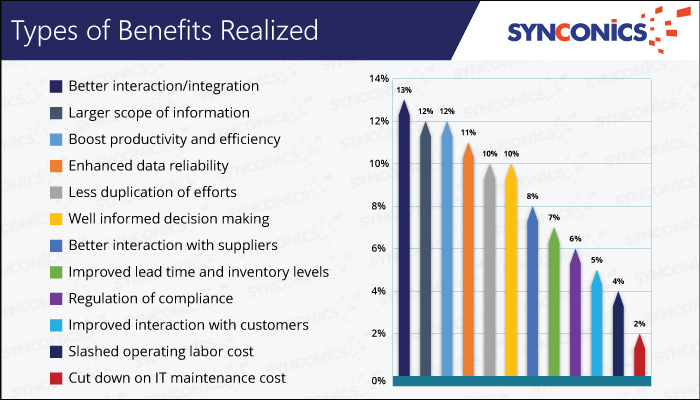Odoo ERP Report Of Synconics
Synconics Technologies Pvt. Ltd. has developed Odoo ERP Report 2017. This report summarizes Synconics’ independent research between April 2016 to March 2017 from the experience of our collective 150+ customer leads, inquiry, and true deployment with regard to overall implementations and satisfaction; keeping in mind organization size, industries, and geographic locations.
Apart from analyzing the type of companies using ERP, we have also analyzed why do we need ERP. Invariably the most substantial reason for companies to implement ERP is practically to stay in the competition. Without a comprehensive system, it is impossible to stay competitive. In our report, we have also covered customization and its percentage.
customization depends on how companies position their strategic business issue and integrates it with a process redesign effort, which is more likely to succeed in ERP implementation. In our report, we have pointed out the benefits realization time-frame, which can ensure a successful implementation.
Industries:
Synconics has served companies from different industry verticals. Of the customers we had in this period, 30% of our customers were distribution companies or companies with their distribution departments who opted for Odoo. Please refer to the graph for more details. This includes projects for small-medium-size small-medium-sized companies, where limited customization was needed.
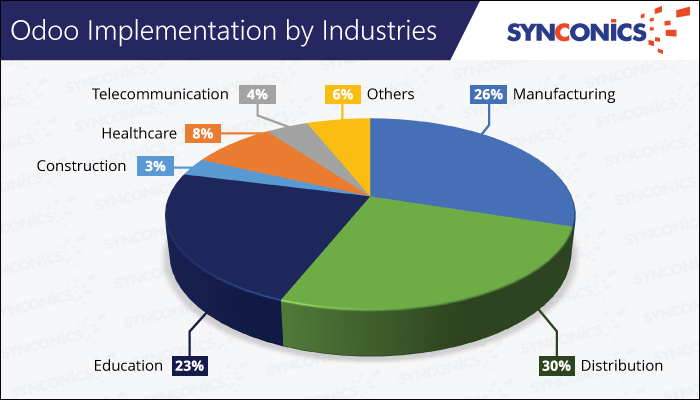
Reasons for implementing ERP:
With ERP applications, business activities and company performance can be better monitored and controlled. It is a given fact that one of the biggest reasons to implement ERP solutions is to create a common IT platform across the company.
Odoo’s modern ERP solutions allow a great degree of flexibility without custom code. This type of solution gives the best of both worlds – a highly tailored experience, without specialized code that will keep you from changing processes or upgrading. In terms of product, Odoo is going way beyond traditional ERP. The Odoo solution is ideal for SMEs but fits both small and large companies alike.
It may be helpful, to begin with the most basic systems and then expand to other functional areas. Synconics also suggests using change management techniques to manage the human dimension of the project, since ERP requires a great deal of support from affected areas of the company. Finally, we emphasize that once the ERP system is in place, companies need to interpret the data collected carefully and accurately if the system is to contribute to business planning.
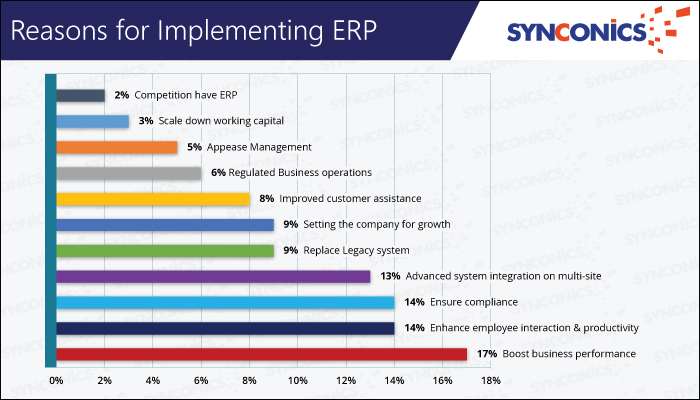
Customization:
The crux of any software is how much it meets the business requirements rather than providing the existing features to the company with standard processes. With customization, many companies have given life to their work process. As the system is customized with their requirement more likability, productivity and efficiency is increased tenfolds. As per our survey, only 12% use Odoo pure vanilla without customization, but as evident from the graph businesses do need some sort of customization.
We have done customization on almost every module. No two businesses would operate the same way and also it would be really hard to get an entire business system that fulfills their business flow. As such Odoo being highly flexible is gaining ground rapidly.
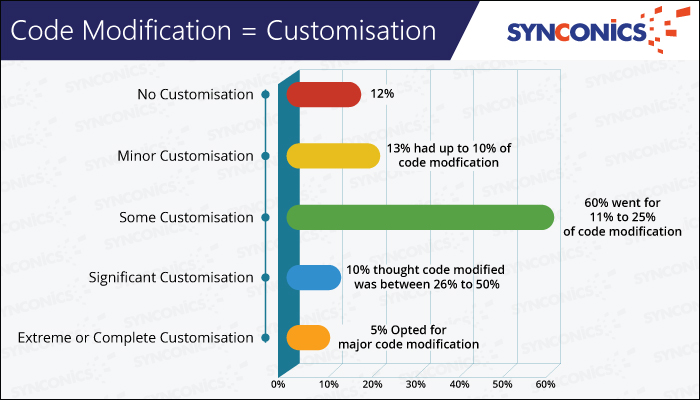
Business Process Management:
The implementation process also served as an opportunity to simplify and restructure business operations to industry best practices built into the ERP system. BPM results in a systematic approach to making an organization’s workflow more effective, more efficient, and more capable of adapting to an ever-changing environment. Here in our survey, 75% agreed to have an overall improvement in their collective business processes.
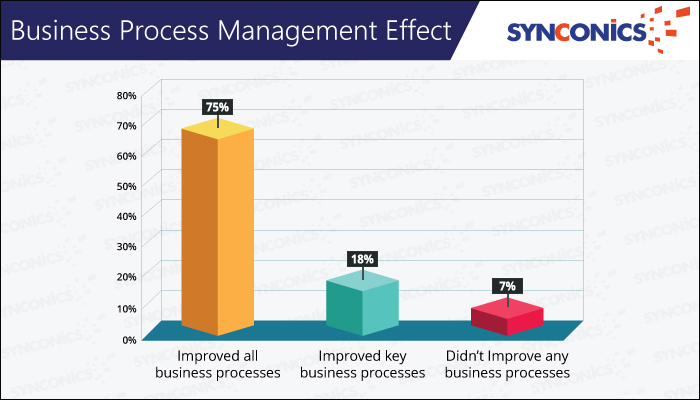
Project Budget and Implementation Cost:
According to our experience and as answered by some clients, on average organizations spend 3.6% of their annual revenue on their project implementation. 13% of companies had over-run their project by 25% while 26% were on a budget or were under budget.
It can be extremely difficult to try and hash out an accurate or precise budget and calendar for an ERP project, and even harder to justify your initial estimates to the stakeholders. The number of complex factors, time, and technology that is involved in an ERP implementation, amount to being one of the major reasons so many modern ERP implementations still seem to go over budget and take months beyond their scheduled go-live date to actually complete.
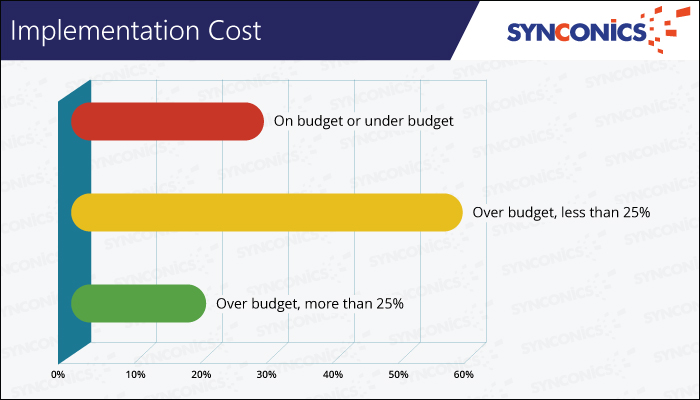
Budget Overruns:
We have observed that though implementation had been finalized by decision-makers on the client’s end, it didn’t take into account some underlying aspects that are involved in this crucial process. One needs to consider the cost of customizations that will be needed to adapt Odoo for individual businesses.
As evident in the representation here 23% of companies had unanticipated technical/organizational issues. So they think that there has been a budget overrun but in reality, they had not done proper gap analysis or business process re-engineering. Had they availed some Odoo training they would have better aligned their business flow with the existing features of Odoo. They should be willing to make some adjustments in their flow or be ready for customization.
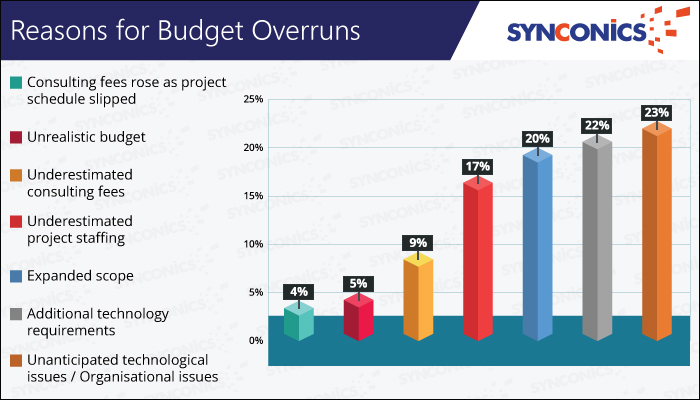
Benefits Realizations:
Benefits realization in implementation is the process of ensuring benefits are identified, defined, linked to strategic outcomes, and delivered. Just as we plan on a schedule for implementation, there also has to be a plan for when and what you expect the benefits to appear. Here we see in our presentation that 4% didn’t have any measurable benefits – could this be a reason that they didn’t plan on what benefits they anticipated by implementing? On the other hand, we observed that 11% of project managers who had planned better reported up to 80 to 100% benefit.
Before any implementation delivers something there is just the prediction that there will be benefits. Realizing the benefits means making them real i.e. actually getting the benefits. One can’t realize the benefits before implementation has been in place. While some processes may take longer before distinct results are visible, there will always be some deliverables that will have benefits immediately.
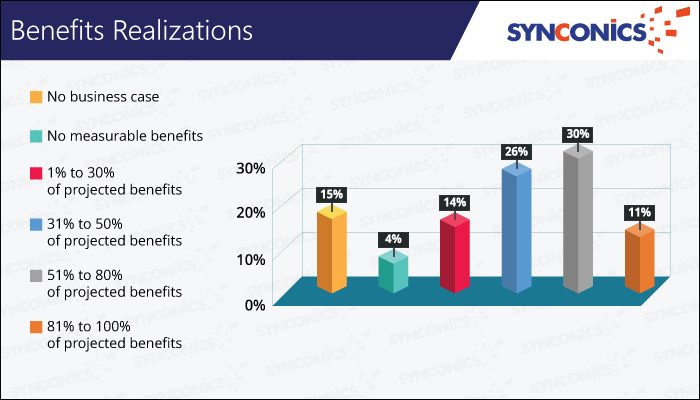
Benefits Realization Time-frame:
ERP software is very complex and tailored to the needs of businesses. The configuration, upgrades, reporting customizations, business process modifications, hosting, backups, and other complexities are often more expensive than the underlying software. For this reason, the cost benefits of implementing Odoo, in the beginning, may seem smaller than they would be for simpler applications such as email or website creation software.
So to represent the Benefits Realizations we have considered a larger time frame, extending it with our previous clients’ feedback. 45% have benefited most when they have got the Odoo ERP system live within 0-6 months.
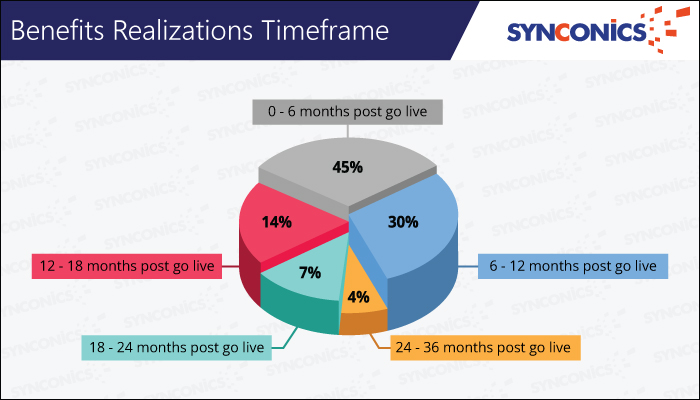
Types of Benefits:
Organizations that choose to utilize ERP systems aim to combine all company functions such as sales, marketing, and manufacturing. The output of such functions are massive amounts of data that managers utilize to effectively accomplish such critical organizational tasks as human resource management, customer service, financing, and inventory management. Types of benefits vary but here is what we found on our survey, as shown in the graph 13% responded that they feel better interacting now as they have access to data post implementation which earlier was only confined to top management. Also, 12% said that the scope of information has increased and this results in better productivity and efficiency (another 12%).
As evident ERP systems are far more complicated than the conventional software package due to the reengineering demanded by ERP of the entire organization. ERP implementations require extensive interdepartmental coordination which adds to the complexity of ERP implementation. As a result, we conclude that the support of management and the execution of the project becomes very critical to the success of ERP implementation.
